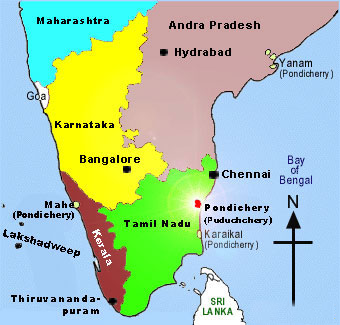Statehood Demand by Puducherry | 01 Jan 2022
For Prelims: States Reorganisation Act, Union Territory, Article-3.
For Mains: Constitutional Provisions related to the creation of new states and related issues.
Why in News
Recently, the Chief Minister of Puducherry has demanded Statehood for the Union Territory (UT) of Puducherry.
- The demand for Statehood is a long pending issue for Puducherry making it unable to exercise any powers for creating employment potential by inviting more industries to Puducherry and also creating infrastructure facilities for tourism.
Union Territory
- UT refers to those federal territories that are too small to be independent or are too different (economically, culturally and geographically) to be merged with the surrounding states or are financially weak or are politically unstable.
- Due to these reasons, they couldn't survive as separate administrative units and needed to be administered by the Union Government.
- UTs are administered by the President. In the UTs Lieutenant Governors are appointed by the President of India as their administrators.
- However, Puducherry, Jammu and Kashmir and Delhi are the exception in this regard and have an elected legislature and government due to the status of partial statehood.
- At present, India has 8 UTs-- Delhi, Andaman and Nicobar, Chandigarh, Dadra and Nagar Haveli and Daman and Diu, Jammu and Kashmir, Ladakh, Lakshadweep, and Puducherry.
Key Points
- Background:
- When the Constitution of India was adopted in 1949, the Indian federal structure included:
- Part A: Former British India provinces that had a Governor and a legislature.
- Part B: The former Princely States that were governed by a Rajpramukh.
- Part C: Chief Commissioners' provinces and some princely states that were governed by Chief Commissioner.
- Part D: Territory of Andaman and Nicobar Islands that was governed by a Lieutenant Governor who was appointed by the Central Government.
- After the States Reorganisation Act of 1956, Part C and Part D states were combined into a single category of 'Union Territory'. The concept of the UT was added by the Constitution (Seventh Amendment) Act, 1956.
- When the Constitution of India was adopted in 1949, the Indian federal structure included:
- Reasons for Demand:
- Linguistic and cultural reasons are the primary basis for creating new states in the country.
- Other factors are:
- Competition for local resources.
- Government negligence towards certain regions
- Improper allocation of the resources,
- Difference in culture, language, religion, etc.
- The economy's failure to create enough employment opportunities
- Popular mobilization and the democratic political process is also one of the reasons.
- ‘The sons of the soil' sentiments.
- Issues Arising Due to Creation of New States:
- Different statehood may lead to the hegemony of the dominant community/ caste/ tribe over their power structures.
- This can lead to emergence of intra-regional rivalries among the sub-regions.
- The creation of new states may also lead to certain negative political consequences like a small group of legislators could make or break a government at will.
- There is also a possibility of increase in the inter-State water, power and boundary disputes.
- The division of states would require huge funds for building new capitals and maintaining a large number of administrators as was the case in the division of Andhra Pradesh and Telangana.
- Creation of smaller states only transfers power from the old state capitol to new state capital without empowering already existing institutions like Gram Panchayat, District Collector, etc. rather diffusion of development in the backward areas of the states.
- Constitutional Provisions:
- The Indian constitution empowers the Union government to create new states out of existing states or to merge one state with another. This process is called reorganisation of the states.
- As per Article 2 of the Indian Constitution, Parliament may by law admit into the Union, or establish, new States on such terms and conditions.
- As per Article 3 of the Indian Constitution, the Union Government has the power to form a State, increase or decrease the size of any State, and alter the boundaries or name of any State.
Puducherry
- Puducherry city is capital of Puducherry UT in southeastern India.
- UT was formed in 1962 out of the four former colonies of French India:

- Pondicherry (now Puducherry) and Karaikal along India’s southeastern Coromandel Coast, Yanam, farther north along the eastern coast, and Mahe, lying on the western Malabar Coast, surrounded by Kerala state.
- It originated as a French trade centre in 1674, when it was purchased from a local ruler.
- The colony of Pondicherry was the scene of frequent fighting between the French and Dutch in the late 17th century, and it was occupied several times by British troops. However, it remained a French colonial possession until it was transferred to India in 1962.
Way Forward
- Economic and social viability rather than political considerations must be given primacy.
- It is better to allow democratic concerns like development, decentralisation and governance rather than religion, caste, language or dialect to be the valid bases for conceding the demands for a new state.
- Apart from this the fundamental problems of development and governance deficit such as concentration of power, corruption, administrative inefficiency etc must be addressed.
Source: TH
